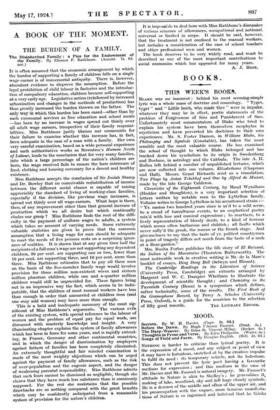A BOOK OF THE MOMENT.
THE BURDEN OF A FAMILY.
IT is often assumed that the economic arrangement by which the burden of supporting a family of children falls on a single
wage-earner is of immemorial antiquity. There is, however, abundant evidence to disprove the assumption. Before the legal prohibition of child labour in factories and the introduc- tion of compulsory education, children became self-supporting at a very early age. Legislative action (reinforced by increased urbanization and changes in the methods of production) has thus greatly increased the burden thrown on the father. The
only way in which this burden has been eased—other than by such communal services as free education and school meals —has been by an increase in wages spread out thinly over
all adult wage earners, irrespective of their family responsi- bilities. Miss Rathbone justly blames our economists for their failure to examine whether this increase has, in fact, been adequate in the case of a man with a family. Her own very careful examination, based on a wide personal experience and such authoritative works as Rowntree's Human Needs of Labour, leads to the conclusion that for very many families, into which a large percentage of the nation's children are born, the wage received fails to ensure the bare minimum of food, clothing and housing necessary for a decent and healthy existence.
Miss Rathbone accepts the conclusion of Sir Josiah Stamp and Dr. Bowley that no conceivable redistribution of income between the different social classes is capable of raising appreciably the standard of living of working-class families, especially if the division, like previous wage increases, is spread out thinly over all wage-earners. What hope is there, then, of any improvement other than that general increase of production which we all desire but which continually eludes our grasp ? Miss Rathbone finds the root of the diffi- culty in the payment of uniform wages to adults, a system which takes no account of varying needs. Some extremely valuable statistics are given to prove that the common assumption that a living wage for men should be adequate to meet the needs of five persons rests on a surprising ignor- ance of realities. It is shown that at any given time half the recipients of a full man's wage are not supporting any dependent children, 30 per cent. are supporting one or two, fewer than 10 per cent. are supporting three, and 10 per cent, more than three. Miss Rathbone estimates that to pay all these men on the basis of the five-member family wage would involve provision for three million non-existent wives and sixteen million phantom children, while one and a-quarter million children would still be unprovided for. These figures bring out in an impressive way the fact, which seems to be indis- putable, that the children of most manual workers have less than enough in order that unmarried or childless men (and one may add women) may have more than enough.
This is a bald and inadequate summary of the most sig- nificant of Miss Rathbone's arguments. The various evils of the existing system, with special reference to the labour of women and the problem of equal pay for equal work, are discussed with masterly knowledge and insight. A very illuminating chapter explains the system of family allowances which has been in force for some years, and is rapidly extend- ing, in France, Germany and other continental countries, and in which the danger of discrimination by employers against fathers of families has been completely eliminated. An extremely thoughtful and fair minded examination is made of the most weighty objections which can be urged against the payment of family allowances, such as the risk of over-population and the eugenic aspect, and the danger of weakening parental responsibility. Miss Rathbone admits that such fears cannot be dismissed as negligible, though she claims that they have much less substance than is commonly supposed. For the rest she maintains that the possible drawbacks are as nothing compared with the great benefits which may be confidently anticipated from a reasonable system• of provision for the nation's children.
It is impossible to deal here with Miss Rathbone's discussion of various schemes of allowances, occupational and national, universal or limited in scope. It should be said, however, that the treatment is not confined to the manual workers, but includes a consideration of the case of school teachers and other professional men and women.
The book deserves to be very widely read, and must be described as one of the most important contributions to social economics which has appeared for many years. A. J. BEST.


















































 Previous page
Previous page